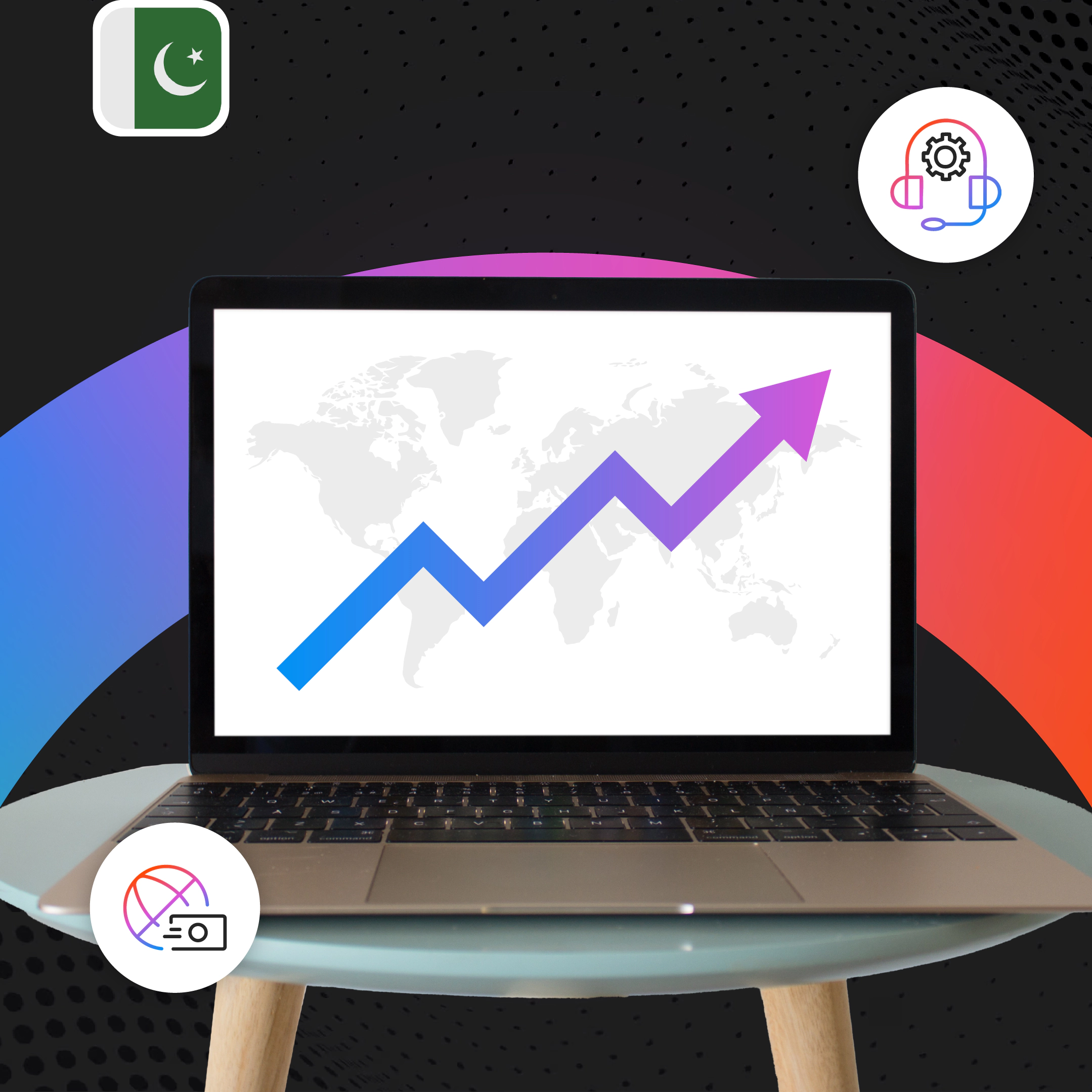How Pakistan’s B2B Services Are Thriving Despite Global Slowdowns
Pakistan’s IT, BPO, and game dev exports hit $3.9B in FY24; growing despite global slowdowns. Tariff-proof digital delivery, cost-efficient talent, and global demand fuel this rise. Pakistan’s service firms are scaling worldwide, powered by Payoneer’s multi‑currency receiving accounts and PKR withdrawals via partner banks.

Introduction
Global business is undergoing a structural transformation amid fluctuations in geopolitical and tariff policies, challenging trade dynamics, logistics bottlenecks, and the aftershocks of the pandemic. While trade volumes have decelerated post-2022, Pakistan’s B2B (business-to-business) services are experiencing sustained growth..
Their digital service exporters, particularly in IT outsourcing, BPO services, and game development, have emerged as powerful engines of growth, showcasing significant resilience amid ongoing volatility by leveraging the country’s young and tech-savvy workforce. From cloud support to digital marketing and software QA testing, local firms in Pakistan are serving clients across North America, Europe and the GCC (Gulf Cooperation Council).
As traditional export sectors grapple with unpredictability, this blog examines how Pakistan’s B2B service providers are effectively addressing these challenges and driving sustained growth across international markets.
Why Do B2B Services Matter in a Tariff-Tense World?
Unlike traditional goods-based industries, digital service exports bypass many of the regulatory and logistical hurdles that slow down physical trade. This structural advantage not only protects them from tariff-related volatility but also gives them a competitive edge in global markets, especially during times of geopolitical uncertainty or supply chain disruption. A key factor in this advantage lies in the very nature of digital trade, as mentioned below.
Zero Customs Allow Instant Market Entry
Unlike merchandise exports, such as textiles, rice, or surgical equipment, digital services do not face any customs duties, meaning they do not pass through any physical checkpoints or port authorities. This makes delivery of such services not only faster and cheaper but also immune to tariff shocks, border restrictions, and freight disruptions.
This exemption allows Pakistani service providers to enter international markets seamlessly, without the delays and costs associated with physical goods, skipping slow-moving channels of sea or air freight entirely.
Furthermore, according to the State Bank of Pakistan, the country’s ICT (Information and Communication Technology) exports have maintained a strong momentum in the first half of FY25 (H1-FY25), growing by a healthy 28.1% on a year-on-year basis.
This was led by robust gains in software consultancy, call centers, and computer services. Beyond headline growth numbers, Pakistani firms are also adapting strategically to global realities.
Sourcing Talent for Optimal Cost-Efficiency
Businesses across the world are working at cutting operating costs while still accessing skilled professionals. Pakistan has emerged as a prime sourcing destination for B2B services, led by its large pool of English-speaking IT professionals and providing quality services at reduced costs. The country houses over 100,000 IT professionals, growing annually, and is ranked among the top countries for freelance services. In addition, Pakistan’s time zone (GMT+5) allows for round-the-clock productivity in global workflows, especially when paired with teams in North America and Europe.
The inherent tariff-proof nature of digital services, combined with their global scalability, positions Pakistan as a resilient force in today’s unpredictable economic climate. With zero customs barriers, surging international demand, and a rapidly expanding tech talent base, Pakistan’s service exporters are not just adapting to change, but are actively poised for sustained international growth.
Sectoral Growth Engines in Pakistan’s B2B Landscape
Amid global economic uncertainty, one of Pakistan’s most promising bright spots has been the surge in digital service exports. From IT outsourcing to BPO and freelancing, these sectors have consistently bucked the slowdown trend, posting year-on-year growth, diversifying clientele, and modernizing business models.
IT Services: Driving Pakistan’s Digital Surge
Pakistan’s IT exports have become a standout performer in the country’s economy. ● As per the State Bank of Pakistan, the country’s ICT exports jumped by a sharp 50% to $3.9 billion in FY24 from $2.6 billion in FY23.
● The sector earned a robust earnings of $1.53 billion between July and November 2024, witnessing consistent double-digit growth across software development, ERP solutions, and cloud technologies. ● IT exports reached $317 million in April 2025, rising 2% YoY. The consistent growth underscores the sector’s robustness and adaptability.
● The sector is expected to hit a $10 billion export target by 2029. ● Supported by more than 17,000 registered companies under the Pakistan Software Export Board (PSEB), these services are delivered to clients in the US, UK, UAE, and beyond.
Companies like Systems Limited and NETSOL Technologies are helping drive international confidence in Pakistani tech expertise, as per PSX IT Sector Report.
Strategic Growth in BPO
Traditionally dominated by voice support and call centres, Pakistan’s BPO sector is moving towards high-value services like remote HR processing, finance and accounting services, procurement and logistics coordination, and lead generation.
● As per PSEB, BPO companies in Pakistan are now over 750, with call centre exports solely contributing $200 million annually. ● The revenues from this sector are expected to grow annually at a 6.23% CAGR (Compound Annual Growth Rate) from 2024 to 2029. ● The country’s BPO sector saw a 20% YoY rise in the earnings generated from call centre exports, reporting $207 million between July and February in FY 24-25.
● With operating costs up to almost 70% lower than in the US and Europe, Pakistan remains a top choice for attracting clients across industries. The Board of Investment of Pakistan recognizes BPO as a high-potential sector. Furthermore, companies like TRG Pakistan and Ibex Global have scaled up operations serving global clients. With competitive labour costs and a growing English-speaking workforce, the BPO industry in Pakistan is capturing market share in voice and non-voice services.
The Rise of the Freelance Economy
Pakistan ranks among the top freelancing countries globally, with more than 3 million active freelancers offering services in digital marketing, software engineering, design, and business consulting. Payoneer plays a pivotal role in enabling such professionals to receive payments in foreign currencies directly into local accounts.
● The gig economy has attracted export remittances of almost $400 million, accounting for nearly 15% of the total ICT remittances.
● In 2023 alone, freelancers contributed more than $1 billion to Pakistan’s economy, highlighting the sector’s significant impact. ● Digital regeneration is reshaping the country’s economic future through freelancing.
Pakistan’s digital service economy is not just surviving — it is expanding rapidly. IT outsourcing, BPO, and freelancing are collectively reshaping the country’s export landscape by offering tariff-proof, globally demanded services.
Case Studies Depicting Pakistani Exporters in Action
The strength of Pakistan’s digital export economy isn’t just reflected in aggregate numbers; it comes to life in the success stories of individual companies. From cloud-based BPOs to global gaming studios, these real-world examples illustrate how businesses are scaling smartly, leveraging technology, and building resilience across markets without relying on traditional export channels.
Game Dev Studio Scaling Global Projects
Lahore-based company Mindstorm Studios, is one of Pakistan’s leading game development firms that has successfully delivered projects to studios in the UAE, Canada, and Southeast Asia. Backed by a team of more than 80 developers, the company has positioned itself as a cost-effective partner for mid-tier mobile gaming studios globally.
This serves as a prime example of successful game development outsourcing in Pakistan, an area rapidly gaining traction due to rising developer costs in Western markets.
Remote Accounting BPO from Islamabad
Headquartered in Islamabad, Escrow Consulting Group provides remote accounting and financial consulting services to UK-based SMEs. With certifications and expertise in leading cloud accounting platforms such as Xero and QuickBooks Online, the firm delivers efficient, cross-time-zone solutions tailored to each client’s operational needs.
Systems Limited: Expanding Global Footprint
Systems Limited is Pakistan’s first software development company. It was established in 1977, and now has more than 5,000 employees. The company has expanded operations to multiple countries including the US, UAE, and Saudi Arabia.
These case studies showcase how Pakistani digital exporters are leveraging sectoral strengths, skilled talent, and smart technology adoption to win global clients across industries.
Smart & Strategic Adaptations by Pakistan
With global demand shifting and digital borders opening wider than ever, Pakistani founders in the digital service sectors must act strategically on staying resilient, scaling fast, and reducing exposure to external shocks. Below are practical, data-backed tactics that high-growth founders are already adopting, and that emerging businesses should consider now.
Diversifying Trade Corridors (Friend-Shoring)
Expanding into the UK and GCC markets can mitigate risks associated with market concentration, as these regions have shown increasing demand for IT and BPO services, offering new opportunities for Pakistani service providers. ● UK Market Potential: The UK’s BPO market is projected to reach $31.46 billion by 2025, driven by high demand for cost-effective, tech-enabled services across sectors.
● GCC Market Growth: The region is experiencing a surge in BPO services, with companies seeking outsourcing partners that offer services with cultural alignment, linguistic familiarity, and substantial regulatory compliance.
Building Value Through Dev & QA Bundling
Offering integrated development and Quality Assurance (QA) services can lead to the delivery of comprehensive solutions to clients, enhancing value propositions and fostering long-term partnerships. Outsourcing QA services allows businesses to save time, reduce costs, and achieve higher product quality without overstretching internal teams.
Digital agencies in Pakistan are increasingly combining design, development, and QA to offer end-to-end solutions.
Leveraging Digital Transformation
Digital transformation is playing a key role in Pakistan’s growth, enhancing energy efficiency, optimizing financial inclusion, and strengthening economic resilience. Businesses are increasingly adopting cloud platforms like Microsoft Azure and AWS, which allow dispersed teams in different cities or countries to collaborate seamlessly. At the same time, the government’s ‘Digital Pakistan’ initiative is helping bridge the digital divide. By early 2024, over 40% of rural districts had fibre-optic internet access, making it possible for tech-enabled businesses to operate from virtually anywhere. This growing infrastructure is driving digital adoption across urban and rural areas, supporting the rise of remote and decentralized service exports.
Reducing Operational Costs through Localization
Pakistani businesses are leveraging digital tools to cut operational costs. One effective strategy has been decentralization – setting up offices in more affordable and lower-cost cities like Faisalabad, Multan, and Peshawar, while keeping main hubs in Karachi, Lahore, or Islamabad. This hub-and-spoke model allows companies to manage expenses more efficiently.
Additionally, many service providers are focusing on specialized, high-margin areas, such as UI/UX design, cybersecurity, and SaaS development, focusing on competing on skill rather than price.
By focusing on agility, specialization, and cost-efficiency, Pakistani digital exporters are not only weathering global disruptions but actively expanding their footprint.
A Few Challenges that Pertain
Pakistan’s digital export ecosystem is expanding fast, but several structural constraints continue to limit its growth potential. They include:
Bridging Infrastructure Divides
Despite rural broadband progress, Tier-2 cities and remote areas face frequent electricity cuts and inconsistent internet speeds, especially during peak hours. The Internet & Society Foundation reports that internet disruptions in 2024 cost the economy an estimated $300 million, with 143 million broadband users experiencing slow service, particularly impacting IT and ITES operations.
Upskilling the Workforce
A significant share of Pakistan’s freelance and BPO workforce lacks formal certifications, especially in specialized domains like cloud computing, cybersecurity, AI, and data privacy. This can limit access to high-value projects that increasingly require verified skills. A need for more training and certification programs, along with upskilling platforms, arises. However, government efforts like the Pakistan Single Window (PSW) and vocational partnerships with universities are bridging these gaps.
How Does Payoneer Fit the Puzzle?
In the evolving landscape of Pakistan’s B2B service exports, efficient and reliable cross-border payment solutions are paramount. Platforms like Payoneer offer solutions such as local receiving accounts and multi-currency support, facilitating smoother international transactions.
Multi-Currency Receiving Accounts
Payoneer provides users with local receiving accounts in multiple currencies, including USD, EUR, GBP, AUD, CAD, and JPY. These accounts function like local bank accounts, allowing Pakistani businesses to receive payments from clients globally as if they had a physical presence in those countries. This feature eliminates the complexities of international wire transfers and reduces associated fees.
Seamless Withdrawals with Meezan Bank
Payoneer has partnered with Pakistan’s leading Islamic bank, Meezan Bank, allowing users to link their Payoneer accounts directly with the bank’s mobile app.
The collaboration has also ensured the automatic issuance of the ePRC (Proceed Realisation Certificate) with each transaction, a document crucial for regulatory compliance and tax purposes in Pakistan.
Integration with HBL for Instant Withdrawals
Payoneer has also integrated with Habib Bank Limited (HBL), enabling its account holders to link their Payoneer accounts through the bank’s mobile app for instant withdrawals.
Target Exchange Rate Feature Payoneer’s Target Exchange Rate feature combats the challenges of fluctuating exchange rates by allowing users to set a desired exchange rate for their withdrawals. Once the market rate matches the target, the withdrawal is automatically processed.
Moving Forward: Future of Pakistan’s B2B Trade
Amid ongoing conditions like tariff uncertainty, shipping delays, and fluctuating geopolitical alliances, Pakistan’s B2B service sector has carved out a future-proof path, built on digital delivery, global demand, and smart financial infrastructure. By embracing service-based models, businesses are accessing global clients without any friction from customs duties or freight bottlenecks. This agility has allowed Pakistan’s IT and BPO exports to grow even when traditional sectors have slowed down.
Platforms like Payoneer are playing a critical role in this transformation. With features like multi-currency accounts for receiving payments in foreign currencies, seamless currency conversion at transparent rates, and more, Pakistani service providers can get paid without leaving their home country.
If you are a BPO services provider, freelance game developer, or IT consultancy agency looking to scale globally while reducing forex exposure and administrative complexity, it is time to align your financial backend with your international ambition.
Scale your B2B business without worrying about FX volatility or payment delays. Open a Payoneer account today and start receiving client payments like a local — in USD, GBP, EUR, and more.
Related resources
Latest articles
-
Employment laws in Sweden
Explore the employment laws in Sweden, a comprehensive guide to employees’ rights, employer obligations, and fair labor practices.
-
Employment laws in Poland
Explore the ins and outs of employment laws in Poland, an info-rich guide to employees’ rights, employer obligations, and fair labor practices that shape the future.
-
Employment laws in Indonesia
Find out more about Indonesia labor laws that dictate how employees should be contracted, managed, and paid, both on a national and state/territory level.
-
Employment laws in France
Learn about France’s labor laws dictating minimum wage, benefits, and more. Plus, discover the consequences of non-compliance with employment laws in France.
-
Employment laws in Spain
Find out more about Spain’s labor laws, from contracts and benefits to termination rules.
-
Employment laws in Australia
Find out more about the employment laws in Australia that dictate how employees should be contracted, managed, and paid, both on a national and state/territory level.
Disclaimer
The information in this article/on this page is intended for marketing and informational purposes only and does not constitute legal, financial, tax, or professional advice in any context. Payoneer and Payoneer Workforce Management are not liable for the accuracy, completeness or reliability of the information provided herein. Any opinions expressed are those of the individual author and may not reflect the views of Payoneer or Payoneer Workforce Management. All representations and warranties regarding the information presented are disclaimed. The information in this article/on this page reflects the details available at the time of publication. For the most up-to-date information, please consult a Payoneer and/or Payoneer Workforce Management representative or account executive.
Availability of cards and other products is subject to customer’s eligibility. Not all products are available in all jurisdictions in the same manner. Nothing herein should be understood as solicitation outside the jurisdiction where Payoneer Inc. or its affiliates is licensed to engage in payment services, unless permitted by applicable laws. Depending on or your eligibility, you may be offered the Corporate Purchasing Mastercard, issued by First Century Bank, N.A., under a license by Mastercard® and provided to you by Payoneer Inc., or the Payoneer Business Premium Debit Mastercard®, issued and provided from Ireland by Payoneer Europe Limited under a license by Mastercard®.
Skuad Pte Limited (a Payoneer group company) and its affiliates & subsidiaries provide EoR, AoR, and contractor management services.














